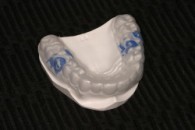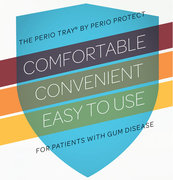New Studies Confirm Efficacy of Perio Tray® Delivery
January 12, 2015 (PRLEAP.COM) Health News
January 12, 2015 - Perio Protect LLC (St. Louis, MO) - Data from two new studies demonstrate the efficacy of Perio Tray® delivery of antimicrobials deep into periodontal pockets. One study confirms previous research results and the other breaks new ground indicating the systemic effects of good periodontal health. The 6-month controlled clinical trial, published in the current issue of the American Journal of Dentistry, compared the treatment outcomes of scaling when combined with prescribed Perio Tray delivery of medication with the therapeutic results of scaling alone. The study found that treatment groups with the combined therapy had significantly greater reductions in bleeding and pocket probing depths than those subjects who received scaling alone. The results of this trial validate the conclusions of previously published studies.
Also published recently were the results of a pilot study demonstrating that comprehensive periodontal care, which including Perio Tray delivery, led to extraordinary reductions in arterial inflammation markers (Lp-PLA-2). The pilot study is expected to lead to additional research and development.
Almost half of Americans have periodontitis and millions more have gingivitis. Those who have been diagnosed are generally treated with periodic in-office, invasive procedures. "Our traditional reliance on mechanical debridement and surgery for treating periodontal disease clearly is not working well," says Dr. Duane Keller, the Chief Scientific Officer at Perio Protect and full-time independent dental practitioner. "And it's no wonder why. The underlying cause of gum disease is a chronic biofilm infection. Biofilms grow quickly in the mouth and when they are lodged in pockets 3+mm deep, they are nearly impossible to reach with tooth brush, rinse, or floss. We need a way to address the cause of the disease that is effective, simple, and comfortable. That is why the Perio Tray is an important technological breakthrough. It can deliver antimicrobials deep into periodontal pockets and hold them there long enough for the medication to fight the infections."
The 6-month clinical investigation evaluated the efficacy of prescription tray delivery of peroxide gel (with and without doxycycline) as an adjunct before and after SRP. Fifty-seven subjects completed the trial. Statistical analyses show that for all comparisons, reductions in deep pockets (>5mm) for both test groups (tray/peroxide + SRP) were statistically greater (P< 0.001) than the control (SRP only), reflecting an average improvement in deep pocket depth over SRP of nearly 1 mm that persisted for 6 months. Analysis of shallower pockets at baseline showed the same relationship between groups. Bleeding scores were reduced significantly only for test groups before SRP. Two weeks post-SRP, mean bleeding reductions for test groups were significantly greater than the control, and remained so for most comparisons.
According to the researchers, these results corroborate the findings of an earlier trial that involved different subject population and different clinical examiners. The authors of the article emphasized that Perio Tray delivery would be beneficial as full-arch treatment for numerous deep and/or bleeding pockets. The delivery technique also allows for adjunctive care at the earliest stages of disease before potential extensive tissue damage occurs. The researchers noted that overall subjects in this trial, as well as in the previous study, received the tray delivery well, especially after observing rapid improvements in their oral condition.
Improving periodontal conditions is a significant achievement; however, in light of the associations between gum disease and chronic inflammatory conditions like diabetes and cardiovascular diseases, good periodontal health takes on new importance. Researchers and medical practitioners alike have long wondered if treating periodontal disease could have a positive impact on the treatment of other associated diseases.
With this concern in mind, Dr. Duane Keller began tracking inflammatory markers such as lipoprotein-associated phospholipase A2 (Lp-PLA-2), which indicate risk of heart attack and ischemic stroke. The Lp-PLA-2 calculations derived from Silver Staff testing were used to determine to what extent, if any, treating periodontal disease may affect changes in Lp-PLA-2 levels. Results from the pilot study, recently published in Cardiovascular System (ISSN: 2052-4359, 2014;2(8): http://dx.doi.org/10.7243/2052-4358-2-8), demonstrate a correlation between the patients' periodontal conditions and their Lp-PLA-2 levels. After initiating comprehensive periodontal therapy that included at-home daily delivery of antimicrobials using Perio Trays, each patient had a corresponding decrease in periodontal markers as well as Lp-PLA-2 levels.
The implications of the findings from this small study, that periodontal disease treatment may be important as an adjunct of cardiovascular treatment, merits additional testing in controlled clinical trials.





